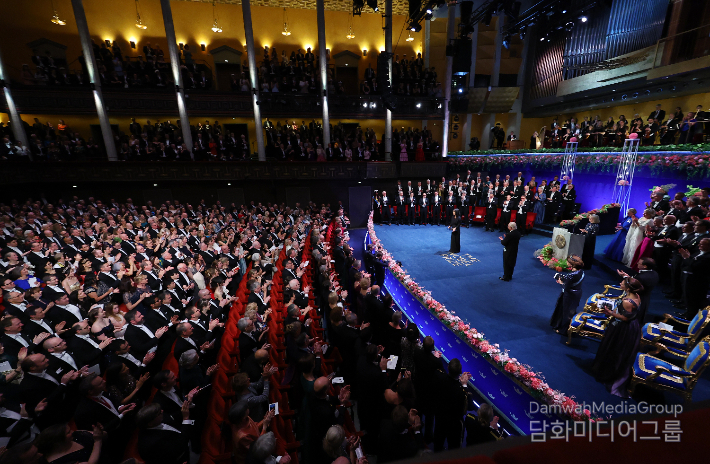By Diplomacy Journal Kayla Lee
Novelist Han Kang, 54, became the first Korean and the first Asian woman to win the Nobel Prize in Literature on Dec. 10 (local time), joining the ranks of the world's leading literary figures.
Han wore a black dress to the ceremony at the landmark Konserthuset in Stockholm, Sweden, at 4 p.m. local time, where she was called fourth in the order of the award and received the Nobel Prize in Literature medal and certificate from Swedish King Carl Gustaf XVI.

As the king entered to the sound of Mozart's March, accompanied by an orchestra, Han joined the other laureates and took her seat at the center left of the stage in the ceremony room.
South Korean winner walks 'blue carpet' for first time in 123 years
The Nobel Prize ceremony has a strict dress code, with men wearing tailcoats and women wearing evening gowns or traditional clothing from their home countries. Han wore a black dress.
Ellen Matsson, who introduced the literature laureate, called her “Dear Han Kang” in English and asked her to “please come forward to receive your award from His Majesty the King.”
As Han stood up and made her way to the center of the stage, the room erupted in applause as she accepted her medal and certificate and shook hands with the King with a beaming smile.

Han is the 121st winner of the Nobel Prize in Literature and the 18th woman. With the exception of the Nobel Peace Prize, which is awarded separately in Oslo, Norway, it will be the first time in 123 years that a South Korean has received the Nobel Prize on the blue carpet of Stockholm's Concert Hall since it was first awarded in 1901. The late former President Kim Dae-jung received the Nobel Peace Prize in 2000.
“Han dealt with historical experience, ultimate pursuit of truth”
In his opening remarks at the ceremony, Nobel Foundation President Astdir Bidding introduced the winners of each category and explained that the literature prize was awarded to “works that profoundly explore human frailty against the backdrop of historical trauma.”
The Nobel Prize for Literature was presented by Swedish novelist Ellen Matsson, a lifetime member of the Hanlim Institute, who said Han's work is “ultimately a search for truth.” “White is the color of snow in many of her works, which creates a protective barrier between the narrator and the world, but it is also the color of sadness and death,” he said, noting that “red stands for life and, on the other hand, pain and blood.”
“Her voice (in the work) may be mesmerizingly soft, but it speaks of unspeakable cruelty and irreparable loss,” he said. ”The colors white and red symbolize the historical experiences that Han recalls in her work.”
“In Han Kang's works, there is a constant change in which the boundaries between dream and reality, past and present, are blurred,” Matson said, referring to the 2021 novel ”Never Say Goodbye.”
In announcing the prize in October, the organization said Han's work is “intensely poetic prose that confronts historical trauma and reveals the fragility of human life,” adding, “She has a unique awareness of the connection between body and soul, the living and the dead, and has become an innovator in contemporary prose with her poetic and experimental style.”







